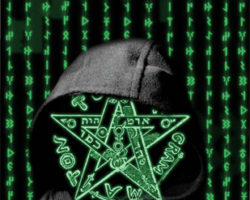Black Hat Magic by Brendan Cass is a role playing game supplement published by Skirmisher Publishing for use with the Pathfinder Roleplaying Game. As such, it is covered by the Open Game License with some parts considered to be Open Game Content as a result.
This is a fourteen page PDF that is available from RPGNow for $0.99 but was purchased at the greatly reduced price of $0.01 as part of a special bundle. Two pages are the front and rear covers, one page is blank, two pages are the front matter, one page is an illustration, one page is the Open Game License and one page is an ad for other supplements.
The supplement starts with an opening paragraph on how both advanced computer and magic users share many traits and that they might therefore use their abilities in similar ways. In this case, a magical counterpart for computer malware.
 Next are sections on various types of real world computer malware. These are Hoax, Trojan Horse, Virus, Worms and Adware. In each case how the actual malware or hoax works is detailed, followed by suggestions as to how this could be translated into magic. For example, for Hoax there is a suggestion that wizards could receive a hand-delivered letter saying that there is a magical virus that requires them to delete the spell magic missile from their spellbooks. There are no actual game stats attached to any of these.
Next are sections on various types of real world computer malware. These are Hoax, Trojan Horse, Virus, Worms and Adware. In each case how the actual malware or hoax works is detailed, followed by suggestions as to how this could be translated into magic. For example, for Hoax there is a suggestion that wizards could receive a hand-delivered letter saying that there is a magical virus that requires them to delete the spell magic missile from their spellbooks. There are no actual game stats attached to any of these.
Finally, the main content is a Pathfinder prestige class, the Spellhacker. Spellhackers must be of a non-lawful alignment, have 7 ranks in Spellcraft, be able to cast arcane scrying and be a member of the spell hacking underground community. The various Hacker Special Abilities are all based on real-world hacking concepts and methods, such as Denial of Spells, Man in the Middle and Social Engineering.
Black Hat Magic in Review
The PDF is bookmarked but this could have been done with more depth. However, for a short supplement this depth is not really needed. Navigation is okay. The text maintains a two column format and no errors were noticed. There are a number of illustrations, one old public domain related to the Trojan Horse and others computer-based with a magical overtone. Presentation is okay.
The supplement doesn’t involve computers in any way, so don’t expect computational magic. Instead, it translates certain computer concepts into a fantasy setting, using magic instead of computers, explaining how these could work and then basing the Spellhacker class around them.
The first part on the different types of malware is system-neutral and, rather than going into detail, provides various concepts that a GameMaster could use. The Spellhacker class does go into more detail and is an interesting idea, using real world concepts as fantasy special abilities related to spells. Some of the ideas suggested in this supplement could cause as much in-game distress for characters as the similar things done to a computer would for their real world counterparts. The Spellhacker class would need careful examination before adding to a campaign, as it has a lot of special abilities. Black Hat Magic has some interesting ideas and it can be found by clicking here.

Leave a Reply